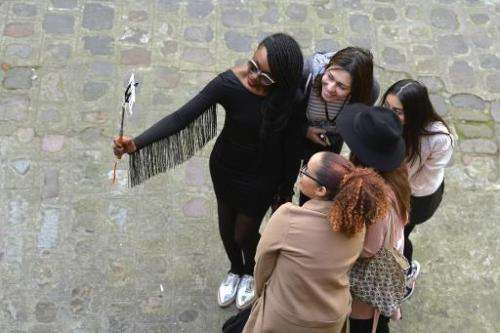Selfie generation warned over eclipse peril

An eclipse that will sweep Europe and parts of Africa and Asia on Friday poses a danger to selfie-takers, eye specialists warned on Thursday.
Even if the Sun is in eclipse, its radiation can still burn the retina, with the risk of permanent damage or even blindness for those who watch it without proper protection.
"Taking a selfie could potentially put you at risk, as you may end up accidentally looking directly at the Sun while aligning yourself and your phone," said Daniel Hardiman-McCartney of Britain's College of Optometrists.
A French association of ophthalmologists and opticians warned eclipse-watchers against using cameras or binoculars to look directly at the Sun.
Nor should they use makeshift filters such as sunglasses or colour bottles, the group, AsnaV, said.
"Looking at a solar eclipse with the naked eye is as dangerous as watching the Sun directly and without protection," AsnaV said.
The French education ministry, which has come under fire for failing to distribute special eclipse glasses to schools, has advised teachers to keep pupils indoors while the event unfolds.
Using a pinhole camera to project the eclipse onto a sheet of paper is a safe way to watch the eclipse, and webcam-coverage is of course safer still, said experts.
"The safest way to view the eclipse is indirectly," said Hardiman-McCartney.
The eclipse will run from 0741 GMT, from a point in the Atlantic, to 1150 GMT, when it will end in east Asia, according to Britain's Nautical Almanac Office.
A total eclipse, running from 0913 GMT to 1018 GMT, will be seen along a narrow 5,800-kilometre (3,600-mile) curve in the north Atlantic and the Arctic Ocean, ending at the North Pole.
But it will make landfall in just two places—Denmark's Faroe Islands and the Norwegian archipelago of Svalbard.
Other locations—Iceland, Greenland, Europe, North Africa, western and eastern Asia—will have partial eclipses, ranging from 99 percent in Iceland to just a couple of percent or less in Iran.
Eclipse safety and webcams:
- eclipse.gsfc.nasa.gov/SEhelp/safety.html
- www.space.com/19195-night-sky- … eroids-webcasts.html
© 2015 AFP




















